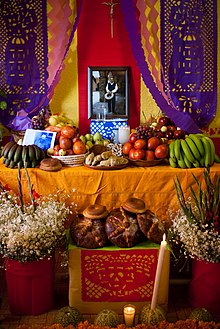Portal:Religion
The Religion Portal
Religion is a range of social-cultural systems, including designated behaviors and practices, morals, beliefs, worldviews, texts, sanctified places, prophecies, ethics, or organizations, that generally relate humanity to supernatural, transcendental, and spiritual elements—although there is no scholarly consensus over what precisely constitutes a religion. Different religions may or may not contain various elements ranging from the divine, sacredness, faith, and a supernatural being or beings. (Full article...)
 Vital article
Vital article
Shia Islam (/ˈʃiːə/) is the second-largest branch of Islam. It holds that the Islamic prophet Muhammad designated Ali ibn Abi Talib (656–661 CE) as his successor (Arabic: خليفة, romanized: khalīfa) as Imam (امام, 'spiritual and political leader'), most notably at the event of Ghadir Khumm, but that after Muhammad's death, Ali was prevented from succeeding as leader of the Muslims as a result of the choice made by some of Muhammad's other companions (صحابة, ṣaḥāba) at Saqifah. This view primarily contrasts with that of Sunni Islam, whose adherents believe that Muhammad did not appoint a successor before his death and consider Abu Bakr, who was appointed caliph by a group of Muhammad's other companions at Saqifah, to be the first Rashidun ('rightful') caliph after Muhammad (632–634 CE). (Full article...)
 Did you know (auto-generated)
Did you know (auto-generated)
- ... that the nonconformist minister Ichabod Chauncey was banished from England under the Religion Act 1592 and spent two years in exile in Holland where he published a defence of his actions?
- ... that religious studies scholar C. Jouco Bleeker believed that religions are like acorns?
- ... that the Grave with the Hands commemorates a married couple, divided by society and religion, with hands clasped over a cemetery wall after death?
- ... that Catherine de Parthenay, a 16th-century Huguenot leader, was a member of "a highly successful network of information" during the French Wars of Religion?
- ... that Gamaliel's principle has been used to support religious pluralism and reforms within religious groups?
- ... that a religious community is a group of people who practice the same religion, but do not have to live together?
The Baháʼí Faith is a monotheistic religion founded in the 19th century that teaches the essential worth of all religions and the unity of all people. Established by Baháʼu'lláh, it initially developed in Iran and parts of the Middle East, where it has faced ongoing persecution since its inception. The religion is estimated to have approximately 8 million adherents as of 2024, known as Baháʼís, spread throughout most of the world's countries and territories. (Full article...)



































































